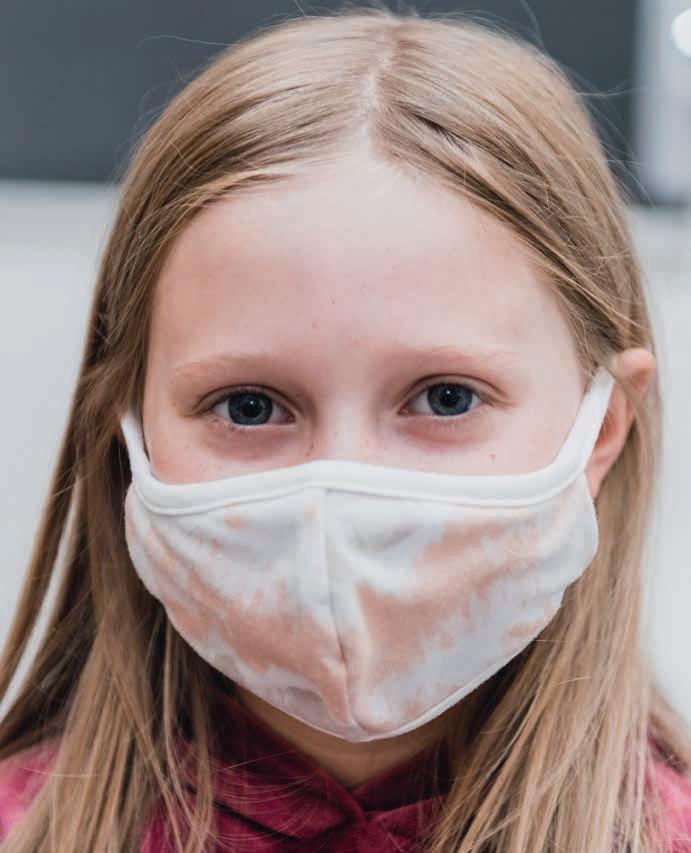INFECTIOUS DISEASES & IMMUNOLOGY The Division of Infectious Diseases and Immunology provides outstanding care for children with infections and immune deficiencies and for children and families who require travel advice. Members of the division are also involved in several NIH-funded research projects including spirochetal infection, Covid-19-related inflammatory disorders, as well as antimicrobial resistance and vaccine development. CLINICAL PROGRAMS In normal times, the Division of Infectious Diseases and Immunology provides extensive inpatient and outpatient consultation and primary services for children and youth with common and complex infectious diseases, congenital and acquired immunodeficiencies, including HIV, and those requiring travel medicine. During the Covid-19 pandemic, the division dramatically expanded its responsibilities to include taking on a variety of critical clinical roles: 1. SARS CoV-2 pathways for clinical care of infected children: Numerous clinical care pathways for the management of SARS CoV-2-infected children were created and used for patient care management under the leadership of Grace Hong, APRN, and Ilana Waynik, MD, of the Division of Hospital Medicine. 2. SARS CoV-2 pathways for employees and their families: Numerous pathways for the protection of employees pre- and post-exposure to Covid-19 infections were created and used as policy by the organization under the leadership of Grace Hong, APRN, and Dr. Waynik. 3. Covid physician on call for the organization: Every week during the pandemic, from 8:30 a.m. to 4:30 p.m., Monday through Friday, one of the Infectious Diseases physicians was on call to answer faculty, community physician, and provider questions about Covid-19, and to provide back-up to the One Call Center. 84
ANNUAL ACADEMIC REPORT 2020
4. Inpatient consultation: Inpatient consultations continued unabated during the pandemic and increased over the last few weeks of 2020 due to an increase in admissions of SARS CoV-2infected children with acute Covid-19 infection as well as multisystem inflammatory syndrome (MIS-C). Due to the pandemic and stay-at-home directives for two of the faculty, the division was short-staffed. Special mention goes to Ed Kim, MD, and Hassan El Chebib, MD, for taking extra inpatient call, as well as to Melissa Held, MD, Alberto Cohen-Abbo, MD, and Connecticut Children’s Physician-in-Chief and division member Juan C. Salazar, MD, MPH. 5. Telemedicine for ambulatory patients: The division pivoted to telemedicine visits to ensure that our patients had continued access during the height of the pandemic. We conducted more than 980 telemedicine visits for the year. We also had 724 ambulatory in-person visits and 56 travel clinic visits. 6. Employee Covid monitoring (occupational health by our family medicine physician and nurses) for employees exposed to and /or infected with SARS CoV-2, to include telemedicine follow-up: Under the leadership of Hank Feder, MD, who is boardcertified in both Pediatrics and Family Medicine, he and the division nursing staff managed employees with positive Covid-19 tests via telemedicine and phone to ensure proper care, treatment and monitoring. In collaboration with Infection Control, follow-up of potentially exposed team members was also done. 7. Ask the Experts: Interim division chief John Schreiber, MD, MPH, gave weekly updates on the Continuing Medical Education (CME) webinar platform Ask the Experts, which was created in response to the Covid-19 pandemic. The weekly webinars help to keep members of our community informed of the latest scientific and clinical updates. This lecture series has maintained strong ratings particularly in the Clinically Integrated Network, and it reaches on average 200 participants weekly.
ANTIMICROBIAL STEWARDSHIP PROGRAM Under the leadership of Drs. Jennifer Girotto, Schreiber and El Chebib, the Antimicrobial Stewardship Program at Connecticut Children’s continued to implement new quality initiatives to improve appropriate usage of antimicrobials. These included improving the 48-hour Best Practice Alert based on provider feedback to ensure provider documentation of 48-hour time-out, implementation of duration into all antimicrobials, and reporting antimicrobial usage to the National Health and Safety Network section of the Centers for Disease Control and Prevention. Additionally, the institution continues to show commitment to patient safety and improved clinical outcomes by supporting a second post-graduate, year-two infectious diseases pharmacy resident, which allows the Antimicrobial Stewardship Program to provide daily support of restrictions, antimicrobial use evaluation, and feedback to clinicians. Vancomycin usage was also closely tracked with reductions in usage. HIV PROGRAM AND SERVICES Despite the pandemic, the Pediatric and Youth HIV Program at Connecticut Children’s, which is comprised of a multidisciplinary team of physicians, case managers, nurses and health advocates, continued to provide timely, family centered, and culturally sensitive care to children, adolescents, and parents infected and affected by HIV. The program has been continuously funded through the Ryan White program for almost three decades, having been awarded over $20 million from the federal government for the provision of direct HIV patient care services. The Ryan White-funded medical case management team stays abreast of cutting edge, innovative and evidence-based practice modalities, augmenting their skills by participating in professional development opportunities through trainings and workshops such as Motivational Interviewing, Couples Testing, Functional Behavioral Assessment, Adolescent Opioid Screening, Brief Intervention and Referral to Treatment (S-BIRT), and Youth Mental Health First Aid. The HIV team has established and implemented an evidenced-informed psycho-educational peer-to-peer group that enhances the overall mental health of our














































